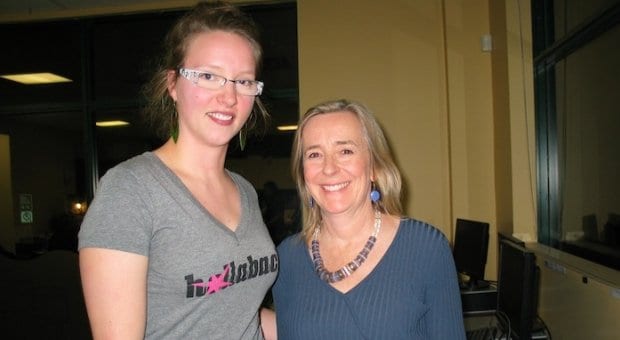Using the term “crack ho” can really change the energy in a room.
About 15 people gathered at the Vanier Community Service Centre on Oct 10 for a “crime-prevention coffee house.” Nancy Worsfold, the executive director of Crime Prevention Ottawa (CPO), discussed the beautification efforts in Vanier, from cleaning up graffiti to getting rid of shrubbery that can offer “hiding places” for drug dealers. Using city services, from calling the city when garbage hasn’t been picked up to calling police when crime occurs, has also helped the community to address safety, she says.
Worsfold was talking about the connection between community spirit and community safety when a resident raised the issue of incidents of breaking and entering. Another Vanier resident, Geoff Derry, said a “crack ho” had committed numerous burglaries in his neighbourhood.
“I’m sorry, I really take offence to the term crack ho,” said Zahrah Hajali, who lives in Vanier.
After a brief back and forth, during which Hajali said it’s fine to object to a person’s actions toward you and your community but not to use oppressive language, Derry said, “I’m not that patient.”
“But patience is what’s needed to build a safer community,” Hajali said. “You can’t build a safe community by isolating a section of it. This is the problem. Vanier is becoming the place where you’re pushing people out who have called Vanier their home for many, many years.”
From Vanier’s gentrification to ongoing sex-worker sweeps dating back several years, efforts to make the community safer often create an “us and them” mentality. Prostitutes of Ottawa/Gatineau Work, Educate and Resist (POWER) has steadfastly said that sweeps put sex workers in danger, forcing them to choose between their safety and their need to make a living.
Despite using the term “crack ho,” Derry says in an interview with Xtra that he recognizes sex workers as fellow community members. In fact, he says, he attended a community meeting with POWER, adding that it’s important to build bridges.
“Right now it’s even questionably legal,” he says, referring to Bedford v Canada, which is awaiting a ruling by the Supreme Court. “I’m fully in favour of legalized prostitution. I’m fully in favour of prostitutes having full recourse to protection under the law in every way and having full access to health services.”
After Worsfold spoke, Julie Lalonde, the site director of Hollaback Ottawa, talked about street harassment.
“Your neighbourhood is the same as every other neighbourhood when it comes to street harassment, but the perception is that it’s sketchier here,” Lalonde said. “The fact that we exist in 64 cities in 22 countries tells you that there isn’t a neighbourhood, there isn’t a city, there isn’t a country in the world that’s really figured out how to address street harassment where there’s zero harassment.”
According to Hollaback Ottawa’s online survey, which was released in July, 97 percent of people said they’d experienced street harassment in Ottawa in the past year. Of about 350 respondents, 84 percent identified as women and 54 percent identified as LGBT.
Although it wasn’t a scientific study, Lalonde says the numbers are in line with national and international statistics, including the low number — six percent — of people who say someone interceded on their behalf after witnessing public harassment.
From calling out street harassers directly, to checking in with someone who’s been harassed to see if they’re okay, to sharing experiences on Hollaback’s website and social media, Lalonde encourages residents to take a stand against harassment.
Hollaback’s website also has practical, detailed advice on how to safely intervene when one sees harassment, Lalonde says.


 Why you can trust Xtra
Why you can trust Xtra


